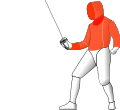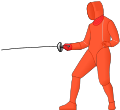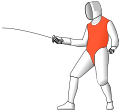new bruises

"It doesn't hurt, does it?"
I've lost count of the number of times non-fencers have posed that question. The majority of people seem to assume that hitting being hit with a sword doesn't hurt because the point is covered - and fencing clothing provides 100% protection. They're a bit shocked when they see the bruises.
Most sports hurt. Just watch runners' faces when they're doing the London Marathon. Even the gentlest sports involve aching limbs while muscle-damage is a frequent problem. Years ago, my daughter lost the use of her right arm for weeks after a teacher urged her to try harder at the shot-putt. (She was 12 and small for her age with no idea of the technique required.) I experienced hockey at school and would say that fencing is less dangerous. My best technique at hockey involved lurking in the pavilion to avoid being hurt - or volunteering as a back on the strongest side. I've been hit by a hockey ball and that was far worse than any fencing injury. Friends and colleagues who go to the gym return worn out and often gasping for a drink.
I suppose what alarms people is the idea that fencers set out to damage each other - that we see bodies in terms of target areas.



But no good fencer sets out to damage or wound an opponent. The aim is to land a secure hit, with just the right degree of force, attaching the blade - although sabres are different because they employ a slashing movement which cuts, usually lightly, to the head or torso. Sometimes I don't even feel the hit scored against me - but that's usually when my opponent is an expert using minimal force and maximum accuracy to score the point.
Bruises happen when a fencer uses too much force or when a fencer moves toward the attack, often to launch her/his own attack. Because of the number of hits in an evening's fencing, bruises are an inevitable result. Sabreurs display red slash-marks on their arms, foilists have small, circular dots while epeeists have larger, darker bruises because of the greater weight of the weapon and the greater force required to score a hit. Often I have a bruised area - usually on my right upper arm - where I've been hit repeatedly. This should tell me about problems I'm having with my guard.
It's quite possible that I cause worse bruises than I receive because I'm a less-practised fencer than most of my opponents and weaker at blade control. Although I'm often advised to be more aggressive, I sometimes move in too fiercely in an effort to attach the point. My opponents are almost always polite and say "sorry" if they think they've hit too hard.
This week I have a blue-purple splodge on my arm just below last week's yellow-green. As summer has arrived, I may have to explain the bruises.
My fitness and fencing are recovering slowly, though I was no match for the chef, who has returned after a couple of weeks' absence. "I'm not fit," she assured me, moving easily through footwork practice, and showing off the depth of her lunge.
 (The dancer has a brilliant lunge - the lowest I've ever seen. He was showing it off before sabre practice. Sadly he's deserted the epeeists for a couple of weeks, just because he wants to prepare for a competition.) Of course, it took me a while to land a single hit on her and, when I did, most of them were doubles.
(The dancer has a brilliant lunge - the lowest I've ever seen. He was showing it off before sabre practice. Sadly he's deserted the epeeists for a couple of weeks, just because he wants to prepare for a competition.) Of course, it took me a while to land a single hit on her and, when I did, most of them were doubles.Still, I fenced, I managed some hits and one or two of them pleased me. Between bouts, the chef told us of her planned move to Paris in the autumn - where else would chefs go? I offered her a job swap. I'd have liked to work near the Isle de St. Louis. But negotiations broke down. I was prepared for a salary swap, so long as I kept the cat and she looked after and maintained the teenagers. For some reason, she didn't think this a good deal. So I shall continue fencing in England while the chef will be cooking - and, I hope, fencing - in France.
She came to watch me getting on my bike with sword-bag, rucksack, handbag and water bottle. "You need a mounting block," she remarked. "A girl's bike would be easier." But I love my sturdy bike despite its cross-bar. It cost me £45 in a second-hand bike shop some years ago and was one of the best purchases I ever made. Somehow I managed to mount the bike without a block, at which point the chef noted that I'd forgotten to turn on my rear light. She turned it on for me. Then she said, "If I were your children, I wouldn't let you ride like that."
I said goodbye, wobbled a little, and cycled off into the night.
Labels: bike, bruises, cat, chef, cycling, dancer, fencing, footwork, lunge, Paris, sword bag, teenagers


2 Comments:
You be careful on that bike, even though it has to be good for you.
Also, is a " mounting block " something you stand on to mount or is it a block you use to chock the tire while you mount? It is a term I have never heard before.
I often worry about women and children who fence going to a doctor and they think they are being abused.
In the area were I live there are safe/good places to ride a bike around universities and parks, however it is unsafe in the extreme in most places. I wish that weren't so.
Your friend,
Jim
In many British towns and villages you can still see mounting blocks, used so that people could mount their horses.
(I found this picture on the web http://farm1.static.flickr.com/111/301910347_a608c75a90.jpg?v=0 though I think most mounting blocks are stone rather than brick.
I often begin visits to doctors by explaining the origin of the bruises. I point out they are usually on or near my sword-arm. I'm afraid that the bruises were rather visible today as it was too hot to wear long sleeves.
There are good cycle routes here. I used to commute into central London by bike, though not while trying to balance a bag of swords. My main worry is that I'll leave the bike somewhere and come back and find it's been stolen. My main dislike when I'm cycling is articulated lorries - I was knocked off my bike by one when I was a student. (I don't think the driver noticed and I was well enough to remount and cycle back to college.)
The fact that I'm still alive suggests I'm a better cyclist than I sometimes think.
Post a Comment
<< Home